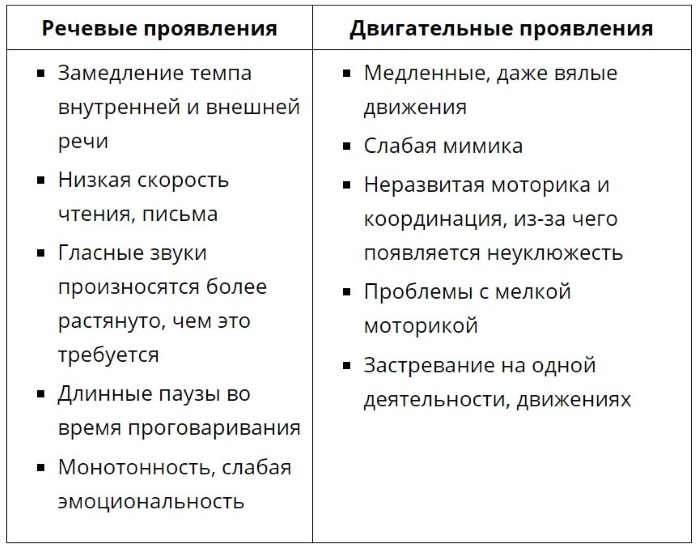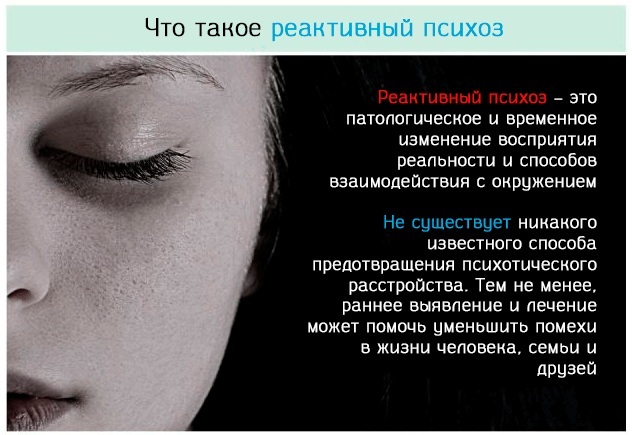Neurasthenia is one of the most common nervous diseasesto which people of all genders and ages are exposed. The danger is that people often do not notice its symptoms and signs, and it progresses, causing more severe conditions.
The content of the article:
- 1 What it is?
- 2 Classification and types
- 3 How to distinguish neurosis from VSD
-
4 Causes of the disease
- 4.1 Among women
- 4.2 In men
- 4.3 Children of different ages
- 5 The main symptoms
- 6 Possible complications
- 7 Diagnostics
-
8 Treatment
- 8.1 Medication
-
8.2 Folk remedies
- 8.2.1 Mint and lemon balm tea
- 8.2.2 Motherwort decoction
- 8.2.3 Hawthorn tea
- 8.3 Diet therapy
- 8.4 Psychological treatment
- 8.5 Physiotherapy
- 9 Video about neurasthenia
What it is?
Neurasthenia is a neuropsychiatric disorder characterized by depletion of the nervous system. Neurasthenia can occur in a person of any age as a result of prolonged internal experiences and external influences that have a negative effect on the functioning of the nervous system.
Classification and types
Neurasthenia, the symptoms and signs of which are often mistaken for prolonged fatigue, has 3 forms (stages):
- Hypersthenic (excitable). It manifests itself in the form of frequent and severe irritability, decreased performance and poor concentration. Migraines (especially in the evening) and general weakness of the body may occur.
-
Irritable weakness. The patient often feels irritability combined with rapid fatigue. Outbursts of aggression or anger reach their peak and end in tearfulness. The patient begins to worry about problems from the internal organs.
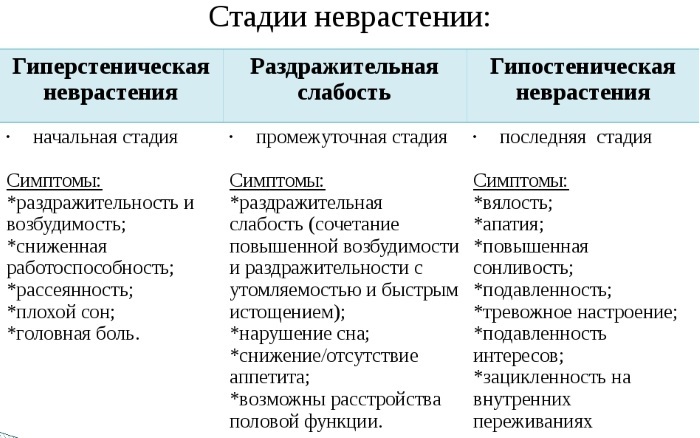
Neurasthenia stages and types - Hyposthenic (inhibitory). The patient becomes passive and apathetic. He has no interest in almost everything, he cannot concentrate on any activity. The focus is on one's own inner feelings and condition, which can cause hypochondriacal symptoms and complaints.
How to distinguish neurosis from VSD
Neurasthenia refers to neuroses - a group of psycho-neurotic diseases, which, most often, are based on an internal personality disorder. VSD or vegetative-vascular dystonia is a functional disorder of the nervous system and has about 40 different symptoms (mental and physical), similar to those of neurasthenia. Sometimes some neurologists take VSD for neurosis.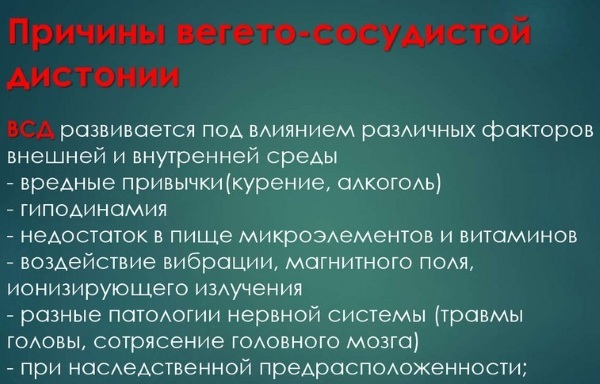
It is the disease that can be distinguished by the constancy and frequency of occurrence of symptoms - they appear gradually, but often they are pronounced - a person can accurately describe his symptoms. With VSD, many patients cannot clearly describe their feelings and indicate only poor health or weakness at times.
Causes of the disease
Common causes of neurasthenia for all people are: increased mental and physical activity, frequent stress, lack of sleep, the presence of any diseases. All these factors lead to the fact that there is a characteristic inhibition of the nervous system, and then its depletion.
Neurasthenia in women, men, and children can also develop for a variety of reasons, despite common symptoms and signs.
Among women
Women are more emotional than men, so they are more prone to neurasthenia. Most often, the cause of this disease in women is family problems, the presence of complexes, dissatisfaction with their lives. For these reasons, a woman begins to experience emotional distress, which entails the development of neurotic symptoms.
In men
In men, neurasthenia most often develops due to general reasons: a complex schedule (especially the alternation of day and night shifts), overwork, any diseases in the body. It is also possible the occurrence of neurasthenia due to an unhealthy psychological state, to which they can lead problems in sex life, dissatisfaction with oneself as a man or “crisis of average age ”.
Children of different ages
Neurasthenia (symptoms and signs in children most often seen by parents) can occur in a child of any age. But most often it is exposed to school-age children and adolescents.
In children of primary school age, the disease can develop due to frequent quarrels and disputes between parents - such situations are reflected in the psychological state of the child, and he withdraws into himself. Less commonly, neurasthenia occurs due to increased workload at school and various circles.
In adolescents (12-17 years old), neurasthenia can develop due to many reasons:
- quarrels between parents, divorce of parents;
- frequent conflicts with classmates, parents;
- bullying at school;
- high mental stress;
- fear of not meeting parental expectations;
- constant dissatisfaction from the parents.
Due to the fact that the child often experiences mental, physical and psychological stress, sooner or later a failure will occur in the work of his nervous system. Also, older children often go to bed late, which leads to a lack of sleep - one of the main causes of neurasthenia.
The main symptoms
Neurasthenia manifests itself in the following symptoms, which are the most common and on the basis of which the diagnosis is made:
| Symptom | Description |
| Increased irritability | The patient begins to be annoyed by everyday things that he had not noticed before. An inadequate and violent reaction in the form of screams, throwing of objects can occur even for minor reasons (for example, a noisy ticking of a clock or a loud intercom ringing). |
| Too frequent emotional manifestations | Outbursts of aggression become too frequent, but at the same time short-lived. The patient retains consciousness and later realizes that he was too aggressive. |
| Depressed mood | The patient becomes apathetic, ceases to enjoy anything (even things that pleased him before) and laughs.
|
| Strong emotions | In some cases, patients with neurasthenia, on the contrary, express their emotions too violently: they laugh very strongly and loudly, become restless. |
| Constant feeling of tiredness and weakness | A person constantly feels weak, it is difficult for him to engage in physical activity. |
| Sleep disturbances | The patient either cannot fall asleep due to disturbing thoughts (insomnia), or, conversely, cannot sleep normally, although he goes to bed on time. Superficial sleep, with frequent waking up (a person can wake up even from the slightest noise); disturbing dreams and nightmares can also be troubling. Often neurasthenics wake up tired and without mood; during the day they experience severe drowsiness. |
| Increased tearfulness | A neurasthenic person can start crying at any time, even if he has not been subject to tearfulness before. Any reason can bring to tears: a quarrel, a movie, any unpleasant thing. |
| Headaches and migraines | The patient is often worried about girdle headaches, which usually appear in the evening. |
| Memory and attention disorders | Manifested in the inability to remember something or concentrate on any thing or action; distraction also develops. |
Depending on the age, individual symptoms may appear. In adults, due to neurasthenia, sexual disorders can occur: in men, potency deteriorates, and in women, sexual desire weakens.
In children, school grades deteriorate due to symptoms of neurasthenia. The child becomes lethargic and apathy, stops walking with friends and often becomes pensive.
Possible complications
Over time, neurasthenia can develop into more serious psycho-neurotic diseases. One of the most severe of these is depression, which will have to be treated with antidepressants.
Due to constant apathy, a person's social skills deteriorate: he stops communicating with people. This can lead to the fact that the patient will find it difficult to be in society over time.
Also, neurasthenia can lead to chronic disorders of the internal organs. In neurasthenics, pathologies of the cardiovascular and nervous systems are often found, as well as digestive disorders due to frequent experiences. Many patients are malnourished due to lack of appetite, which leads to severe weight loss and dystrophy.
Diagnostics
Neurasthenia, symptoms and signs of which worsen the patient's quality of life, requires immediate treatment. If you suspect neurasthenia, you can contact any of 3 specialists: a neurologist, psychiatrist or psychotherapist. If necessary, he will give a referral to other narrow doctors.
When making a diagnosis, the doctor listens to the patient's complaints, paying attention to:
- speech (slowed down or accelerated, voice volume and intonation);
- behavior (anxious or too passive, aggressive);
- reaction to doctor's questions;
- state of memory, attention, thinking.
Also, the doctor must collect an anamnesis: learn about the patient's lifestyle, the presence of chronic diseases (including those of close relatives), taking medications drugs, the time and duration of the onset of symptoms, the presence of the cause of the neurasthenic state (whether this was preceded by a mental or psychological injury).
To exclude the presence of infectious lesions of the body, intoxication and some diseases, a sign of which there may be neurasthenia, additional diagnostics are prescribed using laboratory and instrumental methods. Sometimes neurasthenia is a manifestation of brain pathologies (tumors, neuroinfections).
To exclude the diagnosis, the patient is examined using magnetic resonance imaging. To assess blood circulation in the vessels of the brain, rheoencephalography is prescribed - a method based on recording electrical potentials.
Treatment
Neurasthenia, the symptoms and signs of which depend on the cause of the disease, requires an integrated approach to treatment. First of all, it is necessary to find the cause of the development of neurasthenia and eliminate it. If this is any disease, then appropriate therapy is prescribed; if stress is a psychological trauma, then measures are needed to eliminate stress from life and internally work out the trauma.
Regardless of the reason, the patient needs to put his lifestyle in order:
- get enough sleep (go to bed no later than 23:00);
- normalize the mode of work and rest, do not overwork;
- eat properly and fully;
- walk more often in the fresh air;
- establish a clear daily routine;
- do light exercises in the morning;
- do not smoke, drink alcohol or take drugs.

Doctors advise finding something enjoyable to do. It can be reading, creativity, charity - such activities will help to distract from your inner state.
Medication
Drug treatment is of an auxiliary nature. It is prescribed depending on the form of the disease, the severity of the symptoms, the individual characteristics of the organism and the age of the patient.
| Group of drugs | Action | What form of neurasthenia are prescribed | Names of funds |
| Sedatives | They have a sedative effect, help to normalize sleep, eliminate insomnia. | With hypersthenic (excitable). | Persen, Novo-Passit, valerian root or motherwort in various forms. |
| Nootropics | They normalize blood circulation in the brain (due to which the supply of oxygen to the organ is improved), help to strengthen memory and attention. | In front of everyone. | Tenoten, Picamilon, Calcium hopantenat, Pantogam. |
| Antidepressants | Suppress depression, improve mood. | With hyposthenic (inhibitory). | Fluoxetine, Azafen, Amitriptyline. |
| Tranquilizers | Eliminate the feeling of anxiety and fear, relieve nervous tension. | With all forms, accompanied by a feeling of anxiety and fear, panic attacks. | Phenozepam, Chlordiazepoxide, Diazepam. |
| B vitamins and drugs to strengthen the nervous system | Prescribed as a general tonic. Normalize the work of the nervous system. | In front of everyone. | Folic acid, Magne B6, Magnelis B6. |
Folk remedies
With neurasthenia, you can independently prepare some remedies according to folk recipes, but in order to avoid complications and side effects, you need to consult a specialist.
Mint and lemon balm tea
This tea soothes and relaxes well, so it is recommended to drink it shortly before bedtime.
 It is necessary to pour in 1.5 tsp. l. mint leaves and lemon balm with hot water (temperature about 80 degrees, since boiling water destroys the beneficial properties of herbs) and leave to infuse for 15 minutes.
It is necessary to pour in 1.5 tsp. l. mint leaves and lemon balm with hot water (temperature about 80 degrees, since boiling water destroys the beneficial properties of herbs) and leave to infuse for 15 minutes.
Motherwort decoction
Motherwort decoction has a sedative effect, helps relieve nervous tension and improves sleep. For cooking, you need 1 tbsp. l. Pour motherwort herbs with 1 glass of hot water and simmer in a water bath for 15 minutes. After that, cool and strain, take 2-3 times a day after meals. The course of treatment is a month.
Hawthorn tea
Hawthorn has a tonic effect, relieves nervous tension and improves the functioning of the cardiovascular system. To make tea, you need to pour 1 tbsp. l. berries with a glass of hot water and leave for 15 minutes.
Diet therapy
Proper nutrition is essential in treating not only neurasthenia, but other neurological diseases as well.
Patients often have digestive disorders, so you need to follow 4 rules so that food is better absorbed in the body:
- Food should be light. During the treatment period, it is better not to eat fatty, fried, too spicy and salty foods. The diet should be dominated by fruits and vegetables (without coarse fiber), greens, whole grain bread, cereals, nuts, fish and lean meat.
- Diet. You need to eat often, but in small portions. This will help avoid overeating, and food will be better and faster digested in the digestive tract.
- Adequate amount of liquid. Lack of regular water can negatively affect health in general, so you need to drink at least 1 liter of pure water (mineral water can be used) per day.
- Calmness. Eating should be done in a calm and comfortable environment. It is not recommended at this time to watch TV, read a book or newspaper, discuss unpleasant topics.
During (and after) treatment, it is recommended to limit the consumption of the following foods as much as possible:
- high in refined white sugar (sugar causes rapid fatigue and contributes to the development of depressive conditions);
- animal fats, mayonnaise, margarine (the fats contained in them interfere with the normal absorption of other nutrients and disrupt metabolism);
- alcoholic beverages (alcohol contributes to the exacerbation of depressive states, since a feeling of emptiness and discontent later comes to replace a good mood, aggression may occur);
-
coffee, strong tea (the caffeine contained in them increases a person's excitability);

- starchy foods: corn, potatoes, flour (they contain easily digestible "fast" carbohydrates, which provoke the release of large amounts of glucose and insulin into the blood, the level of which also drops sharply later, which causes dizziness and feeling fatigue).
Psychological treatment
The goal of psychological treatment (or psychotherapy) is to explain to the patient the essence of his diseases, help to deal with his internal state and find ways to get out of the created situations.
For this, different methods of psychotherapy are used:
- Rational psychotherapy - the doctor helps the patient to consider and evaluate his actions from the outside, to change the idea of himself and the surrounding reality.
- Cognitive-behavioral - helps to determine what thoughts, actions or situations can cause nervous tension and stress; also with this method of psychotherapy, ways of dealing with these situations are sought.
- Auto trainings - the patient is taught to independently deal with stressful situations, sources of irritation using methods of self-control and quick relaxation.
- Body-oriented - helps to get rid of muscle clamps and blocks, excessive muscle tension, which can be the cause of an unstable psychological state.
Methods of psychological treatment can be combined, which increases the effectiveness of therapy.
Physiotherapy
Physiotherapy for neurasthenia helps to normalize the nervous system, relieve tension, improve metabolism and blood circulation in the body.
Depending on the type of disease and contraindications, they may prescribe:
-
Electrosleep - a special electrode hoop is put on the patient, through which impulses act on the brain tissue; as a result of this, a person is immersed in a therapeutic sleep, a balance of neurohumoral processes in the body is achieved, and a sedative effect is obtained.
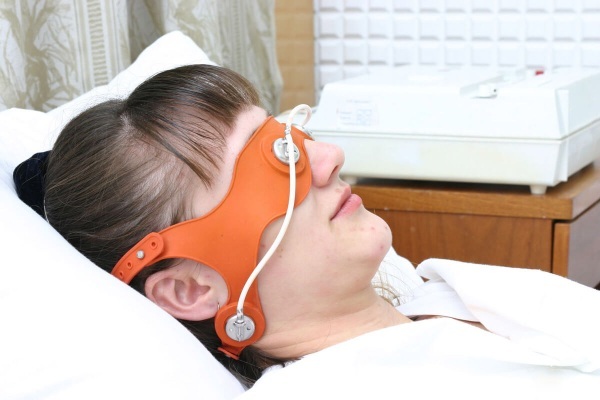
- Massage - helps to relieve nervous tension, improve blood circulation and lymph flow in tissues, restore efficiency.
- Aromatherapy - a procedure, the essence of which is to inhale air saturated with aromatic vapors coming from oils. The type of oils is selected individually for each patient, with neurasthenia, oils with a sedative effect are useful: ylang-ylang, bergamot, orange, patchouli, lavender. You can also use baths with the addition of these oils.
Neurasthenia responds well to therapy. If you do not ignore its symptoms and signs and turn to a specialist in time, then the disease can be cured quickly and prevent the development of depression.
Article design: Vladimir the Great
Video about neurasthenia
Psychologist and Neurasthenia:

